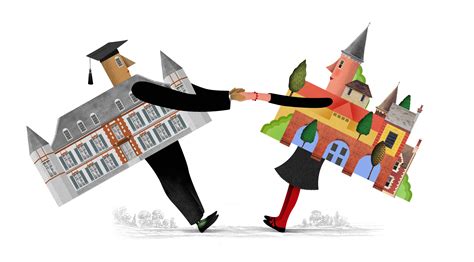A town-gown relationship refers to the dynamic interaction between a university or college and the surrounding community. It encompasses the various ways in which these two entities interact, cooperate, and sometimes clash. Understanding town-gown relationships is crucial for fostering mutually beneficial relationships and addressing potential challenges.

Historical Origins
The concept of town-gown relationships dates back to medieval times when universities were established in close proximity to towns. These institutions often relied on the local community for services and supplies, while the townspeople benefited from the economic and cultural opportunities provided by the university.
Characteristics
Town-gown relationships can manifest in various forms, influenced by factors such as:
- Size and location: The size and proximity of the university to the town can significantly shape their interactions.
- Academic orientation: The research or teaching focus of the university can influence its priorities and the nature of its relationship with the community.
- Community demographics: The social, economic, and cultural characteristics of the town population can shape its expectations and involvement with the university.
Benefits of Positive Town-Gown Relationships
Fostering positive town-gown relationships offers numerous benefits:
- Economic development: Universities contribute significantly to local economies through job creation, research funding, and student spending.
- Cultural enrichment: Universities provide educational, artistic, and cultural opportunities that enhance the vibrancy of their host communities.
- Community engagement: Universities can facilitate community involvement through service learning, research partnerships, and outreach programs, fostering civic responsibility.
- Student development: Positive relationships with the local community provide students with opportunities for real-world experiences, internships, and cultural immersion.
Strategies for Effective Town-Gown Relationships
Building and maintaining effective town-gown relationships requires a concerted effort from both sides:
- Open communication: Establishing open and transparent channels of communication between the university and community is essential.
- Shared decision-making: Involving both university and community stakeholders in decision-making processes ensures that all perspectives are considered.
- Collaborative partnerships: Universities and towns can benefit from forming partnerships to address common goals and challenges, such as economic development or environmental sustainability.
- Conflict resolution mechanisms: Establishing mechanisms for resolving conflicts and addressing concerns is crucial for maintaining harmonious relationships.
Why Town-Gown Relationships Matter
Positive town-gown relationships contribute to the overall well-being and prosperity of both the university and the community. They create a symbiotic ecosystem where each entity benefits from the other’s presence. By fostering these relationships, universities and towns can:
- Enhance economic growth and vitality
- Promote cultural diversity and intellectual stimulation
- Cultivate a sense of place and community belonging
- Attract and retain talented students and faculty
Tables
| Indicators | University Benefits | Community Benefits |
|---|---|---|
| Research funding | Increased research funding | Economic development |
| Student enrollment | Increased enrollment | Cultural enrichment |
| Faculty expertise | Access to specialized expertise | Community engagement |
| Service learning | Student engagement | Civic responsibility |
| Indicators | University Challenges | Community Challenges |
|---|---|---|
| Space constraints | Limited campus space | Traffic congestion |
| Noise and pollution | Noise and air pollution | Housing affordability |
| Student behavior | Student behavior issues | Crime and safety |
| Parking and transportation | Parking and transportation issues | Environmental concerns |
Frequently Asked Questions (FAQs)
Q: What is the difference between a town and a gown?
A: “Town” refers to the local community surrounding the university, while “gown” refers to the university itself.
Q: Why are town-gown relationships sometimes strained?
A: Strained relationships can arise due to factors such as noise, traffic, student behavior issues, and differing priorities.
Q: How can universities improve their relationships with the community?
A: Universities can focus on open communication, shared decision-making, collaborative partnerships, and conflict resolution mechanisms.
Q: What are the benefits of strong town-gown relationships?
A: Positive relationships contribute to economic development, cultural enrichment, community engagement, and student development.
Q: How can students get involved in town-gown initiatives?
A: Students can participate in service learning programs, volunteer in the community, and engage with local organizations.
Q: What is the role of local government in town-gown relationships?
A: Local government can facilitate communication, mediate conflicts, and implement policies that support harmonious coexistence between the university and the community.
Conclusion
Town-gown relationships are complex and multifaceted, with the potential for both positive and negative outcomes. By understanding the dynamics of these relationships, universities and communities can develop strategies to foster mutually beneficial partnerships. By nurturing collaboration, open communication, and shared decision-making, they can harness the power of their shared space to create thriving and vibrant environments.
